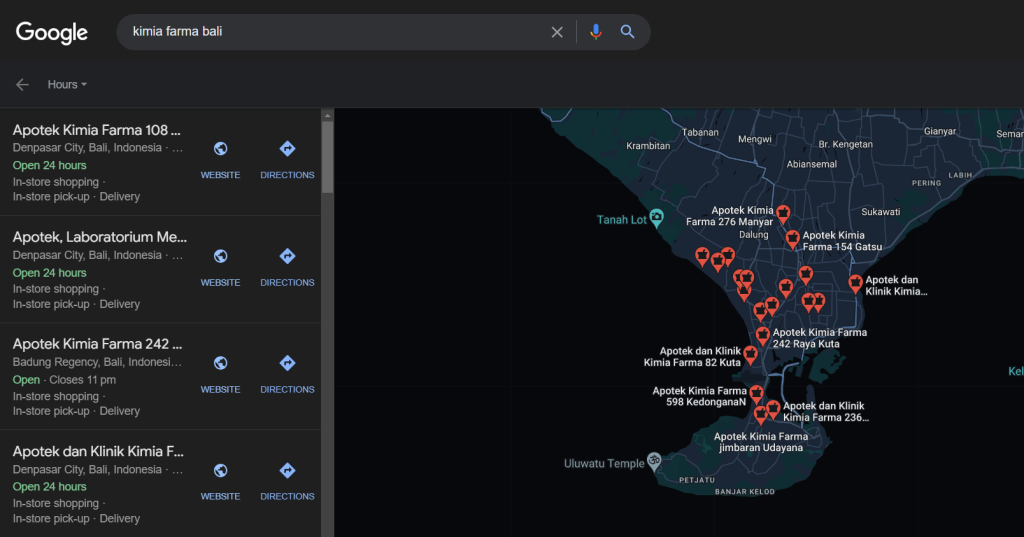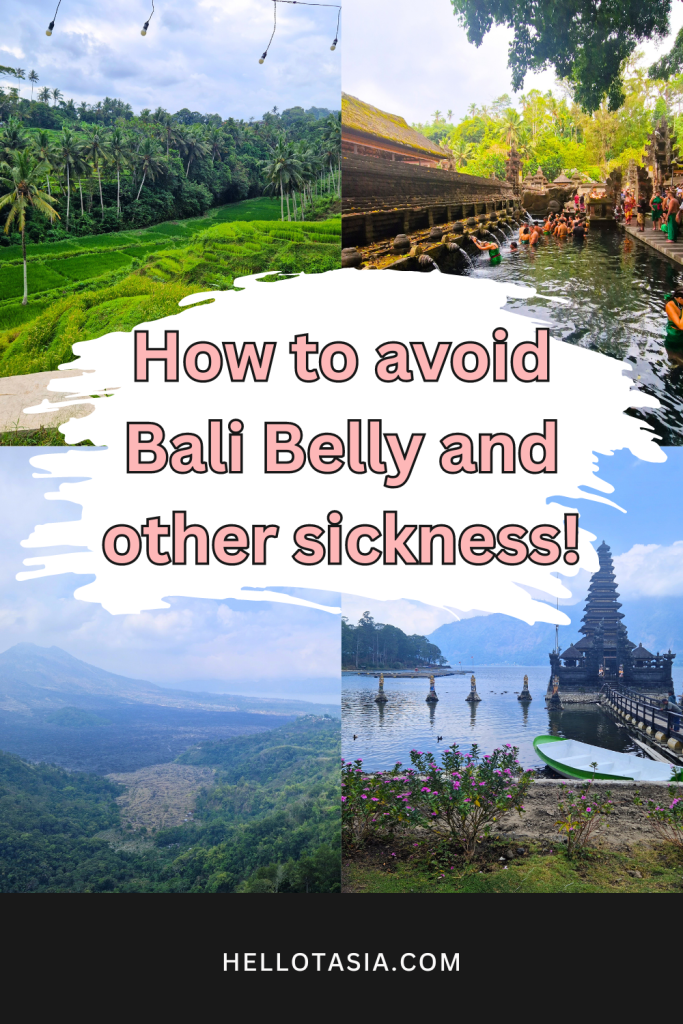Originally published on June 14, 2024 | Last updated on April 21, 2025
Travelling to Bali is a dream come true for many, with its gorgeous crystal blue beaches, warm culture, and delicious cuisine. However, amidst the excitement, there’s one thing every traveller dreads: Bali Belly. This common travel ailment can turn your vacation into a nightmare, causing stomach cramps, diarrhoea, and nausea. But don’t worry! With a few simple precautions, learn how you can avoid Bali Belly and other sicknesses, ensuring your trip is as enjoyable and smooth as possible.
Don’t forget to read this ultimate Bali travel guide for first timers before you set off! And read this secret hack in finding cheap flights to Bali before you book your flight. Now, how to avoid Bali belly!
What is Bali Belly?
“Bali belly” is a common term used to describe traveller’s diarrhoea experienced by visitors to Bali. It’s usually caused by consuming contaminated food or water, leading to an upset stomach, cramping, bloating, nausea, and frequent trips to the loo. While it’s typically not serious, it can put a real damper on your holiday if you’re not prepared. It can definitely be serious though so don’t play with fire.
Drink bottled water
Tap water in Bali is not safe to drink. I think this is the biggest reason why people get Bali belly, and in turn, the easiest way on how to avoid Bali belly. So, best to stick to bottled water! If you are staying for a long time, we buy water in gallons (we call it gallon too), which is used in many Indonesian households on daily basis. We have a dedicated gallon dispenser for household uses (heavy uses and every day). Though if you are not staying permanently, these gallon pumps are very affordable and easy to use.
Get some water bottles which you can fill up at home with gallon water so you can be sure you drink safely while out and about. My favourite is my Zojirushi flask, I have 3 of them! They are extremely lightweight and SUPER good in keeping the temperature of whatever liquid you are drinking. I once forgot to drink a tea I’ve made and it’s still HOT three days later. I’m not joking haha. So in the winter, I can warm myself with a bottle of hot tea, and in summer I can cool myself down with iced drinks. So good.
Trust me, you don’t want to risk getting hit with a case of the dreaded Bali belly. Play it safe, stay hydrated, and enjoy your trip without any stomach-related surprises!

Be careful where you eat
There are so many great cuisine to eat in Bali. However, you need to be careful on WHERE to eat them. To pick a safe spot to eat in Bali and dodge any tummy troubles, keep an eye out for places that seem clean and well-maintained. Opt for busy joints where the turnover of food is high, which usually means fresher ingredients. Check out online reviews or ask fellow travellers for recommendations to find places with a good reputation for food hygiene. And if you’re unsure about street food, go for spots where you can see your meal being cooked hot and fresh right in front of you. Trust your instincts and if something feels off, don’t risk it – there are plenty of delicious and safe eats to discover in Bali! Here’s my local’s guide on what to eat in Bali.

Wear mosquitoes repellent
In Bali, having mosquito repellent is super important. With all those pesky mosquitoes around, it’s your best defence against getting bitten and potentially catching something nasty like dengue fever or malaria. So, slather on that repellent and enjoy your time in paradise without worrying about those buzzing bugs!
You can get mosquito repellent anywhere including small shops, and some famous brands include soffel and Autan. There are patches, sprays (buy it local and don’t bring it through your luggage – aerosols are prohibited items!), bracelets and so many other forms. The bracelets even look so nice and don’t even look ugly at all! There’s so many ways to apply mosquito repellant, hopefully one would suit you. I personally like the patches as I can sneak them under my dresses!
Wear long sleeved clothes
Another (more sure) defense against those mosquitoes: long sleeves is your secret weapon! It’s like your own personal armour against those annoying mosquitoes haha. Throw on a lightweight, breathable long sleeve shirt, and you’re good to go. In doubt, there’s so many places around to buy them. Not only will you keep those suckers away, but you’ll also protect yourself from the scorching sun. It’s a win-win situation – stylish and functional!
If you’re sick…
If you do come down with Bali belly, the most important thing is to stay hydrated. Diarrhoea and vomiting can cause your body to lose fluids quickly, so drink plenty of bottled or boiled water, and consider using oral rehydration salts to replace lost electrolytes. Coconut water is also a natural alternative that can help keep you hydrated.
Rest is key—your body needs time to recover. Stick to bland foods like plain rice, toast, bananas, and clear broths until your stomach settles. Avoid dairy, spicy foods, alcohol, and caffeine while you’re unwell. Over-the-counter medications such as loperamide (Imodium) can help manage symptoms for short-term relief, especially if you need to travel. However, they don’t address the root cause, so they’re best used sparingly.
If symptoms last more than 48 hours, worsen, or if you notice blood in your stool, seek medical attention—there may be a bacterial infection that requires antibiotics. Most cases of Bali belly clear up within a few days with proper care, but don’t hesitate to visit a local clinic if you’re unsure.
Finding Pharmacy in Bali
In Bali, you’ll find pharmacies scattered around, especially in tourist areas like Kuta, Seminyak, and Ubud. These pharmacies typically stock a wide range of medications, including over-the-counter and prescription drugs. Look out for signs saying “Apotek” which means pharmacy in Indonesian. Some popular pharmacies include Guardian and Kimia Farma. If you need specific medication, it’s a good idea to bring along the generic name or a picture of the medication, as brand names might differ. Always check the expiry dates and make sure the packaging looks legit.

How to Find Doctors in Bali
If you need to see a doctor in Bali, there are several options available. You can visit private clinics, hospitals, or international medical centers, especially in popular tourist areas like Kuta, Seminyak, and Ubud. These facilities often have English-speaking staff and offer a range of medical services, from general consultations to specialized treatments. Make sure to have travel insurance that covers medical expenses, and keep a list of emergency contacts handy. If you’re staying at a hotel or resort, they can also assist you in finding a reliable doctor or medical facility. It’s always better to address any health concerns promptly to ensure a safe and enjoyable trip.
You typically have to pay for medical services when visiting a doctor in Bali, whether it’s a private clinic, hospital, or international medical center. The cost can vary depending on the type of consultation or treatment you receive and the facility you visit. It’s essential to have travel insurance that covers medical expenses to avoid any unexpected costs.
In Conclusion
In conclusion, staying healthy while enjoying your time in Bali is entirely possible with a bit of caution and preparation. By being mindful of what you eat and drink, practicing good hygiene, and being aware of your surroundings, you can significantly reduce the risk of Bali Belly and other common travel illnesses. Remember to pack a basic medical kit and know where to seek medical help if needed.
Traveling should be about making wonderful memories, not dealing with sickness. By following these tips, you can focus on exploring Bali’s breathtaking landscapes, vibrant culture, and delicious cuisine without any worries. Stay safe, enjoy your adventure, and make the most of your Bali experience!
Check out these 10 common mistakes to avoid while visiting Bali
A little disclosure: there are affiliate links on this page! That just means if you click on a link, find something you like and buy it, we’ll make some cash. Don’t worry, you won’t pay any extra – sometimes you might even get a tasty discount. It’s a win for us and a win for you too! See the full disclaimer here.


I had never heard of this prior to finding this post. WOW! So glad I read this!
I’m curious if you can brush your teeth with tap water, or how do you handle that? Thanks so much for the info!
Hi Amelia – a lot of people avoid it, including my husband (white British who’s not used to Indonesian bacteria!). I personally don’t – and never had any issues. But I’m Indonesian and may be more used to the water. My husband is on the extra safe side. So I think depends on your risk tolerance too 🙂 hope that helps?
If you’re really unsure – I suggest to err on the safe side, bottled water is quite cheap from the supermarket!